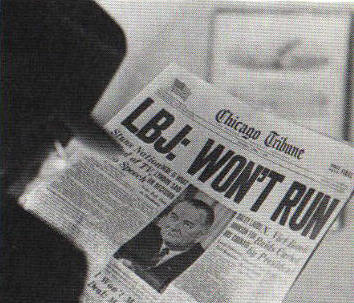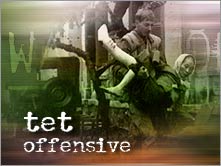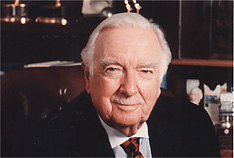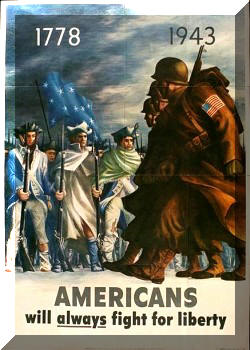| Article Overview:
When Walter Cronkite attacked NBC Baghdad reporter Peter Arnett for
giving an interview to the "enemy," he set himself up for his own
attack. Back in 1968, Mr. Cronkite told the Viet Cong in a
national broadcast that they were winning the war, and America was
defeated. But he was applauded and Peter Arnett was fired.
Why? Find out. |
 VigilanceVoice VigilanceVoice

www.VigilanceVoice.com
Tuesday--April
1, 2003—Ground Zero Plus 566
___________________________________________________________
How Walter Cronkite Ambushed Peter Arnett In Iraq
___________________________________________________________
by
Cliff McKenzie
Editor, New York City Combat Correspondent News
|
GROUND ZERO, New York City, Apr. 1--
Sniper
attacks, booby traps, and suicide bombers are as much a threat to
American journalists as they are to the Marines and soldiers fighting
the war in Iraq. Peter Arnett is one of the first major casualties
of the suicide bombers. It seems he blew himself to bits by letting
his tongue cross over into enemy territory. Some claim, however, he
was blown to bits by friendly fire.
 |
|
Peter Arnett
- 'blown to bits' by friendly fire |
Arnett, a Pulitzer Prize winning journalist for his reporting on the
Vietnam War, gave an interview this past weekend to Iraqi television
in which he said: “The first war plan has
failed because of Iraqi resistance now they are trying to write
another war plan.” Arnett also said that if American planners
had listened to him, they would have prepared for the war
differently.
(Link to text of Arnett’s interview)
Following the Sunday airing of the interview, NBC and National
Geographic fired Arnett. On Monday, Arnett went live on the Today
Show and apologized to the American people for his comments. Arnett
was one of the few reporters to remain in Baghdad during the 1991 Gulf
War. He reported for CNN, and was criticized for promoting civilian
casualties inflicted by U.S. errant bombs. Some claimed he was being
used by Iraq as a propaganda tool.
Leading icons of journalism, including Walter Cronkite, rose
in support of Arnett's removal as NBC and National Geographic
correspondent. Cronkite called Arnett's comments "irresponsible."
(link to NYTimes editorial)
For the uninitiated, it was the kettle calling the pot black.
Cronkite set the standard for news commentators to support
the enemy. In fact, he is cited as on of the key factors to
America’s shameful retreat from Vietnam.
The incident occurred on February 27, 1968. Cronkite was
the CBS news anchor, and the most watched man on television. On a
global basis, he was credited to be the world’s most credible person.
In other words, he was “god of truth” to thousands.
On February 27, after his report on the Tet Offensive, he
delivered a personal commentary not unlike that of Peter Arnett. He
issued his personal opinion to the world that considered his words
gospel.
He said the war was unwinnable (i.e, America had lost) and
ended his assault on American war strategy with this summary: “
But it is
increasingly clear to this reporter that the only rational way out,
then, will be to negotiate. Not as victors, but as an honorable people
who lived up to their pledge to defend democracy and did the best they
could."
Reports from President Lyndon Johnson's aides confirm that Mr.
Johnson was watching the broadcast. After hearing Cronkite's report,
he allegedly put his head in his hands and moaned: "If we lose
Cronkite's support, we've lost the war." A month later Johnson
declined to run for reelection and announced he was seeking a way out
of the war. David Halberstam has written "it was the first time in
American history a war had been declared over by an anchorman." "
 |
|
Soon after
losing Cronkite's support, LBJ announced he would not run for
reelection |
In 1968, no one fired Mr. Cronkite, or claimed his comments inspired
the Viet Cong to increase more attacks. No one hinted he had acted
treasonous. No dared to hint that the morale of American troops
dropped following Cronkite’s comments.
The Tet Offensive was a crushing blow to U.S. forces and
military planners. It was not unlike the unexpected fierce fighting
American troops are facing in Iraq. The Tet Offensive proved the
enemy's ability to inflict great loss and exhibit a maximum resolve
despite overwhelming differences in firepower.
 |
|
Turning point
in the Vietnam War |
The battles to control the cities and towns of Iraq are not dissimilar
to the impact of the Tet Offensive. Local factions rallied,
supporting the Viet Cong against the “invaders.” In a parallel, the
sniping and suicide bombings and guerrilla tactics of Iraqi fedayeen
may be inspired by the David vs. Goliath resolve of the Middle East,
just as it was in Southeast Asia three decades ago..
Reports of immigrating "suicide bombers" coming into Iraq from
neighboring nations to lend a hand in the battle against the
"infidels" have peppered the news. Saddam Hussein is counting on
building popular support for his battle by soliciting surrounding
nations. Peter Arnett’s comments added fuel to this fire, suggesting
that it was the people’s will to resist that America underestimated,
and inferring it will be the people’s will to resist that will drive
America from victory.
Public resistance, guerrilla warfare outside Baghdad, is in
opposition to the original war plan for Iraq. Despite back-peddling
by war planners, the public knows Iraq was to be a "shock and awe"
war.
American and British muscle was to be delivered with such
power and force it would cause the enemy to stagger out of Baghdad
with their hands raised, holding their leader, Saddam, either at
gunpoint or with his head on a stick.
It was also widely held that enroute to Baghdad, Iraqi
citizens in the north and south would rise up in support of the
coalition and toss away their weapons. America would be cheered as
it rolled toward Baghdad.
 |
|
Cronkite
called Arnett's comments "irresponsible" |
That didn’t happen. Peter Arnett was right. American strategists
miscalculated Iraqi resolve. But that does not mean the war is lost,
or unwinnable.
While I'm not a Peter Arnett fan, it startled me that Walter
Cronkite was leading the parade to crucify Arnett. In the April 1
New York Times editorial, he pompously states that Arnett
"criticized the American military effort and praised the morale of the
Iraqi people and the cooperation of Iraq's information ministry."
Later, Mr. Cronkite says of Arnett, "He besmirched his reputation,
offended a nation and lost his job--justifiably so..."
Let’s turn the pages of history back a little. Wasn’t it
Mr. Cronkite who, in 1968 besmirched his reputation, offended a
nation, and criticized the American military effort and praised the
morale of the Viet Cong?
Or did the world erase that piece of history out of respect
for Walter Cronkite?
In 1968, I believe Mr. Cronkite--then the world's most
trusted news icon, and some claim the most credible man in the world
at the time--performed an act of "aid and comfort" to the enemy that
seems far more damaging that what Arnett said this past Sunday.
Arnett simply said America fumbled the ball, lost the first round, and
was scrambling to rewrite its war plan. At the worst, he said
America was in such a hurry it didn't underestimated Iraqi resolve.
At the best, he praised Iraqi resolve.”
During his apology to NBC and the American people on the
Today show, he cited that he said nothing different to the Iraqi
television interviewers than what other journalists say daily in their
comments--the war isn't going as originally expected.
He didn’t say America had lost the war or that it should
retreat. He didn’t say America was wrong, dishonorable, as Mr.
Cronkite implied in 1968.
 |
In his
highly charged emotional commentary 35 years ago, Mr. Cronkite called
for America to retreat, to fold its tent, to slither out of Vietnam
and crawl under some rock.. When he said America should look for a
"way out" his words carried a moral denunciation of the war's
purpose--to liberate the people. He assumed that our intentions in
Vietnam were false for one only retreats from any cause when the one
you battle has a cause greater than yours. Cronkite cut the moral
legs from under the war. He had such power at the time. He
demoralized America’s resolve. After all, he was “god.”
 |
|
Cronkite
called for America to retreat |
In Hanoi, the Viet Cong leapt with joy.
What greater motivation for the recruiting of more troops to
fight the Americans than playing them Walter Cronkite's tape?
What better way to demoralize American prisoners of war than
to let them listen to his commentary over and over, a reminder to all
who had fought and died that America's most credible spokesman had
turned his back on the idea of victory and called for retreat.
By default, Cronkite’s call for capitulation meant all the
spilled blood had been spilled in vain. All the pain and anguish had
been ill directed, ill conceived. All the moral platforms upon which
warriors dedicated their lives when they went into battle and offered
their lives for the freedom of the Vietnamese, were chewed at their
bases by Cronkite's termitic words of defeat and shame. He truly
besmirched America.
For the record, prior to Mr. Cronkite's comments, Americans
suffered 35,486 dead and 180,730 wounded as of January 1968. From
Mr. Cronkite's broadcast date until April 30, 1975, when the last
Marine jumped into the helicopter from the roof of the American
Embassy in Saigon, another 22,716 Americans died, plus 123,974 were
wounded. Total deaths for the Vietnam War were 58,202, and casualties
304,704.
Could it be said that Walter Cronkite's "personal comments"
to the world that America was fighting an "unwinnable war" and that
America should "look for a way out," was inspiration for the enemy to
defeat us.
Could it be said that Mr. Cronkite’s words provided aid and
comfort to the enemy? Could it be said Mr. Cronkite's words
demoralized American troops, and that the deaths of 22,716 Americans
following Mr. Cronkite’s “unwinnable war” speech can be partially
attributed to his comments?
Was he, in fact, in his own nefarious way, a Tokyo Rose?
Did he violate the tenants of journalism at the expense of a
nation for his own glorification?
I find it incredible that we put so much political weight on
what the news reports. A reporter, such as Peter Arnett or Walter
Cronkite, is held up to the world as some massive authority figure,
able to endanger the delicate balance of power between war and peace,
victory and defeat. The truth is the reporter has nothing to do with
the truth, and is as far removed from it as the painter is to the
portrait. The painter cannot know what lies beneath the skin.
I've never been a fan of the media. And especially not of
the war correspondents. As a U.S. Marine combat correspondent, I
wrote about the guts of war, the sweat of it, the blood of it. My
stories were diaries of what I lived and breathed, and reflected the
blood on my hands. I was the painter and the portrait.
I sought not to seek high moral planes to issue judgments
from, but to find the honor in a dying warrior's last breath, whether
he was the enemy or an ally. I tried to dig through the muck of
war's ugliness to find some value buried in the slime, some reason why
a young man might offer his life for people from another land, whom he
had never seen and would never see again. Why was he willing to die
for them?
Nothing in our media talks about that part of war. The
media is all about mud slinging. Who is right? Who is wrong? It's
all about critics. It's all about covering one's ass. It is a video
game with characters presented in one dimension.
 |
|
Arnett
covering the Vietnam War |
Peter Arnett didn't say anything in his interview that CNN or MSNBC or
CBS, NBC and Fox and ABC aren't saying on a 24/7 basis. If there are
“war criminals” aiding and abetting the enemy, then it is the networks
who pay and parade military generals as their "advisors.” I have
seen daily the most powerful military leaders of the 21st
Century standing before maps, pointing out what we are doing and what
we need to do. These men are far more credible than Peter Arnett.
They represent a far greater danger to American security than a dozen
Peter Arnetts, for they know where the truth of military flaw lies,
and they hourly present it on their maps. If Saddam wants to impress
his people, he needs to show a Major General before a map telling
people how the American advance has been stalled by Iraqi forces that
weren’t expected to resist.
So we sacrifice Peter Arnett. We throw him to dogs. We
criminalize him.
And, leading the parade is one of the worst of all war
correspondent criminals, the guy who pulled the rug from under the
Vietnam War, the guy who gave up on every warrior in Vietnam and fed
the enemy the fuel he needed to strike the final blow of defeat on the
U.S.-- none other than Walter Cronkite.
Have we forgotten who we honor?
This "rush to punish" Peter Arnett is just another way of
covering up the ineptitude of the news media to report the war in
Iraq. It's all about top-down reporting. It’s no different than
politics where the leaders talk to leaders and never talk to the
people.
Where is the people news?
Where is the news of the average Iraqi citizen who wants
freedom?
Where is the story of the guy who turned away from being a
suicide bomber to risking his life to fight Saddam's henchmen? Where
is the story of the Marine or soldier dealing with his fears, and
overcoming them because he believes in the cause of liberation?
Where is the message to the world that the war is being fought on the
front lines, and not by the generals or the newsmen?
Peter Arnett is a symbol of the sickness of war
reporting. That sickness is the belief the news will have some
effect on war itself, that it has the power to make or break the moral
constitution of the warriors. NBC and National Geographic and
thousands of newspapers and journalists, including Walter Cronkite,
think Peter Arnett was wrong. They all give him far too much credit.
They give themselves far too much credit.
While I would like to think Walter Cronkite was just as
much a conspirator in the mismanagement of Vietnam as Robert McNamara,
I just can't give him that many kudos. While he was demoralizing,
and probably had some rippling effect on the war, the reason the war
was lost in Vietnam, and will be lost in Iraq, is not because of some
news reporter.
 |
|
America's
leadership is strong |
It
will be lost when the resolve of the warriors fighting the war wanes.
When and if the warriors on the front line begin to believe they are
not fighting for the freedom of the people--that they are not there to
bring the gift of liberty to the children, and their Children's
Children's Children--that's the day the war will be lost.
Daily, there are
wonderful stories of victory to this end that are never reported.
The warrior who befriends a child, helps a family. A soldier who
decides not to shoot at a civilian when he could have. The
warrior who gives his water to the thirsty family. Where are the
human stories?
We see instead, all the
ugliness of war. We hear war's flatulations, and smell the
bile of its waste--the senseless deaths, the cold emptiness of human
waste. Where are the stories worth telling?
I am thankful there is at
least one. It is about American resolve.
Currently,
America's bold position in Iraq is its most important leadership
factor.
The President has
issued a "no surrender" order. So far, he hasn't told his troops
that he's considering a "way out." As long as he keeps his
ear to the rail, and listens not to the news media, but to the
children of Iraq, and their parents, then we'll be on the right track.
 |
|
Arnett's
armor in the Persian Gulf |
This is where Peter Arnett screwed up. He forgot to tell
the Iraqi press that President Bush doesn't listen to the press.
He forgot to tell the Iraqis that Bush and his Administration are
heading to Baghdad and are going to win the war no matter how many
play pages need to be rewritten.
Arnett's arrogance
in suggesting America is a fumbling idiot may have all been a ploy to
seduce the Iraqis into thinking America's moral fiber is unraveling.
But that makes little sense since America needs no spokesman.
Its warriors are the tongues of truth.
And, when a warrior
knows his leader is determined to win, the warrior will follow that
leader to the death. Little praise comes to President Bush
for his boldness to stand up for what is right from the media.
They scoff at his resolve. But the warriors don't.
Iraqi's respect resolve.
The stronger the words of resolve out of Mr. Bush's mouth, the more
strength there is in America as a determined nation.
Iraqis, if they are to be conquered, want the best to conquer them.
The strongest. And, the most fair.
 |
|
Vultures are
ready to swoop down on America's kill |
 |
|
Germany,
France and Russia lead the pack of vultures |
There are many vultures hovering on the borders of Iraq, waiting to
swoop down on America's kill --to try and rip the guts of Iraq
out and feast on them. Germany, France and Russia
lead the pack, with Turkey and Iran breathing heavily behind.
America isn't making
mistakes. When one moves in a straight line toward a goal
without blinking, it only means the goal is clear. Nothing
is going to stop President Bush from winning the war, from removing
Saddam Hussein, and from freeing the Iraqi people.
This gives him
great power.
The President's
resolve is passed down to the troops.

|
|
Walter
Cronkite slinging mud at Peter Arnett |
So this flap over Peter Arnett is nothing but self serving hypocrisy
by the media. And the big mudslinger, Walter Cronkite, is
no better than the guy he's slinging mud at.
It tells you there
is little difference between the news media and politics.
And the truth?
Well, it exists not when a journalist is moving his or her lips.
It only exists when the people, the real people, are being
interviewed.

|
|
The truth in
war is as necessary as it is elusive |
Anyone who measures the amount of time real people talk
versus reporters talking will see the percentage of truths
versus untruths.
Walter and Peter? They ought to do a talk show called:
"How Important I Am--NOT!"
As for Walter Cronkite and Peter Arnett? They
ought to do a talk show together. They are
cut from the same cloth--both think they are important
Voices when they are just whimpers.

Mar. 31--Quiet Mothers Of Peace
©2001
- 2004, VigilanceVoice.com, All rights reserved -
a ((HYYPE))
design

|
|
|